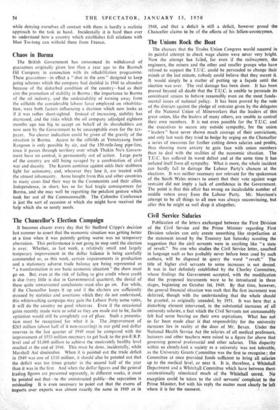Civil Service Salaries
Publication of the letters exchanged between the First Division of the Civil Service and the Prime Minister regarding First Division salaries can only create something like stupefaction at the statement issued by the Treasury last Saturday scouting the suggestion that the civil servants were in anything like "a state of revolt." No one who studies the Civil Service letter, couched in language such as has probably never before been used by such authors, will be disposed to query the word "revolt." The title of higher civil servants to some increases is not denied. It was in fact definitely established by the Chorley Committee, whose• findings the Government accepted, with the modification that the proposed increments were to be introduced in three stages, beginning on October 1st, 1949. By that time, however, the general financial situation was such that the first increment was deferred, though with the understanding that the whole should be granted, as originally intended, by 1951. It was here that a disturbing element intervened, in the substantial increases of all university salaries, a fact which the Civil Servants not unreasonably felt had some bearing on their own aspirations. What has not so far been made clear is that responsibility for the university increases lies in reality at the door of Mr. Bevan. Under the National Health Service Act the salaries of all medical professors, lecturers and other teachers were raised to a _figure far above that governing general professorial and other salaries. This disparity within so closely-knit a society as a university was not tolerable, as the University Grants Committee was the first to recognise ; the Committee at once provided funds sufficient to bring all salaries up to the medical level, or near it. It is, therefore, a Whitehall Department and a Whitehall Committee which have between them unintentionally stimulated much of the Whitehall unrest. No exception could be taken to the civil servants' complaint to the Prime Minister, but with his reply the matter must clearly be left where it is for the moment






























 Previous page
Previous page